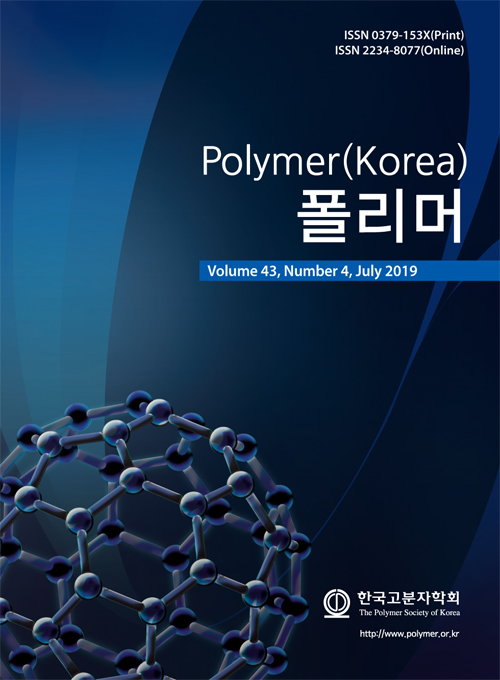- Preparation and Properties of Eco-friendly Polyurethane Composites Using Microcrystalline Cellulose with Secondary Amino Group as Fillers
Youna Lee, Juhyung Lee, Seosuk Park, Kwang-Hee Lim*, and KiRyong Ha†

Department of Chemical Engineering, Keimyung University, Daegu 42601, Korea
*Department of Chemical Engineering, Daegu University, Gyeongsangbuk-do 38453, Korea- 이차 아미노기가 도입된 Microcrystalline Cellulose(MCC)를 충전제로 사용한 친환경 PU 복합체 제조 및 물성에 대한 연구
계명대학교 공과대학 화학공학과, *대구대학교 공과대학 화학공학과
To synthesize polyurethane (PU) composites with high biodegradability, we prepared MCC-TPPI filler first by modifying biodegradable microcrystalline cellulose (MCC) powder with a silane coupling agent, trimethoxysilylpropyl modified polyethylenimine (TPPI). We studied effects of the polyol mixing ratios of bio-polyol (B-2466, MCNC) and poly(tetrahydrofuran) (PTHF, Mw = ~1000 g/mol) and the use of MCC and MCC-TPPI fillers on thermal stability and mechanical properties of polyurethane composites using thermogravimetric analysis (TGA), scanning electron microscope (SEM) and universal testing machine (UTM). The tensile strength, elongation at break and Young’s modulus of PU composites with MCC-TPPI filler were increased more compared to the composites with pristine MCC filler by 1.51, 3.67 and 1.12 times, due to generation of stronger urea bond at the interface of polyurethane (PU) matrix and the MCC-TPPI filler. The bio-based PU composites synthesized in this study have excellent mechanical properties, therefore, they are expected to replace petroleum-based PU, which is widely used to make automotive sheet, carpet and headliner.
높은 생분해성을 가지는 폴리우레탄(PU) 복합체를 합성하기 위하여, 생분해성 미세결정셀룰로오스(microcry-stalline cellulose, MCC) 분말을 실란커플링제인 trimethoxysilylpropyl modified polyethylenimine(TPPI)로 개질하여 MCC-TPPI 충전제를 먼저 합성하였다. Bio-polyol(B-2466, MCNS, Mw = ~2400)과 poly(tetrahydrofuran)(PTHF, Mw = ~1000 g/mol)의 배합 비율과 MCC 및 MCC-TPPI 충전제가 PU 복합체의 열적 안정성 및 기계적 물성에 미치는 영향을 열중량분석기(TGA), 주사전자현미경(SEM) 및 만능재료시험기(UTM)를 사용하여 분석하였다. MCC-TPPI 충전제는 PU 매트릭스와의 계면에서 강한 우레아 결합이 생성되어 MCC 충전제보다 PU 복합체의 인장강도, 연신율 및 탄성률이 각각 1.51, 3.67 및 1.12배 증가하였다. 본 연구에서 합성한 바이오 기반의 PU 복합체는 우수한 기계적 물성을 가지고 있어서, 자동차의 시트, 카페트 및 헤드라이너 등의 제조에 현재 널리 사용되는 석유계 PU를 대체할 수 있을 것으로 판단된다.
Keywords: microcrystalline cellulose (MCC), silane coupling agent, trimethoxysilylpropyl modified polyethylenimine (TPPI), polyurethane, bio-polyol
- Polymer(Korea) 폴리머
- Frequency : Bimonthly(odd)
ISSN 0379-153X(Print)
ISSN 2234-8077(Online)
Abbr. Polym. Korea - 2023 Impact Factor : 0.4
- Indexed in SCIE
 This Article
This Article
-
2019; 43(4): 652-660
Published online Jul 25, 2019
- 10.7317/pk.2019.43.4.652
- Received on May 7, 2019
- Revised on May 17, 2019
- Accepted on May 19, 2019
 Correspondence to
Correspondence to
- KiRyong Ha
-
Department of Chemical Engineering, Keimyung University, Daegu 42601, Korea
- E-mail: ryongi@kmu.ac.kr









 Copyright(c) The Polymer Society of Korea. All right reserved.
Copyright(c) The Polymer Society of Korea. All right reserved.